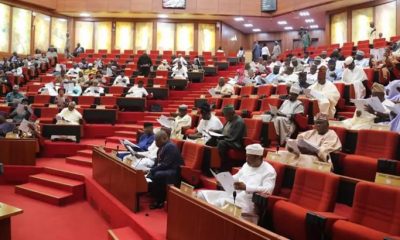Article
How the National Assembly can get its mojo back

Nigeria’s body polity is a farce, albeit a big comedy. The force of habit is such that people constantly do the same thing and expect different results. People who constantly do wrong, unnoticed, persist in the
ignominy, confident in the fact that they would not be caught, when
such continuance is exactly the reason they are bound to be found out.
Etim, who constantly works under decrepit conditions driving a vehicle
with worn tyres is well safe in the belief that no harm will befall him as
a result (since such calamity has not occurred yet), even though the continued driving on such tyres make the event of a fatal accident more
likely to occur. It is the force of habit built on irredeemable fatalism –
that religious concept that evinces the notion of helplessness; where mortals have no control over their own destiny. So, Etim can revel in his folly knowing that he is not destined to die by accident no matter his recklessness. Add vacuous religiosity to the mix and you have a veritable recipe for disaster.

Fortunately, some of us are directly or vicariously responsible for what
becomes of us and accept due responsibilities. This foible is best
underlined by the grim realization that a people get the kind of leadership it deserves. So, while most political elites and institutions are majorly a treatise in disappointment, the parliament is for obvious reasons – considered as the true representative of the genuine wishes and aspirations of the people. Since inception of the commonwealth, the parliament has served as custodian of sovereignty, lending voice to the voiceless and acting as barometer to gauge the temperature of the citizens in matters of state and governance. That is why the institution
is referred to as the first estate of the realm. Instructively, it has been
reasoned that the Senate is based on equal representation, irrespective
of the geographical size or population, to ensure that each state is equally represented on all matters; thereby effectively laying to rest the
perennial hues and cries of marginalization that often dog public
perception.
Though, always under unflinching scrutiny from a suspecting public, it
has been extremely difficult for the National Assembly, especially the
Senate to rid itself of the toga of self-preservation and immoral
placidity. Notorious for its conservatism, the National Assembly, (again, the Senate is more guilty) overtime has in more ways than one served notice of its uncanny propensity to betray its core mandate of
protecting the interests of the electorates either along party lines, on the altar of primordial sentiment or as it has often demonstrated, when
the opportunity to preserve their personal interests is being threatened. One area where the Senate has consistently fallen short of
everyone’s expectations is in the screening of Ministerial nominees. Not
that the expectation is much; the standard is very much pedestrian, yet,
the Distinguished Senators do not seem to realize the importance of the simple task of ensuring that people to be entrusted with the fate and economies of our nation must understand what the job entails and the requirement necessary thereto.
That minimal standard of scrutiny and vigilance expected from the highest lawmaking body in Nigeria is unfortunately turned into a rite of
passage where party supremacy, class/filial interest, financial
consideration and political exigency gain primacy over allegiance to the
electorates that voted them into office. While the need for eternal
vigilance against incompetent and roguish elements from standing
guard over public office has been an imperative since 1999, it has however attained pandemic proportion in recent administrations. With the country groping in the dark and most public office holders ill-equipped or simply lacking the capacity to offer any hue of illumination, it is time for the Senators to stand up and save the presidency from itself and the country from economic and political ruin.
More importantly, by doing the right thing of properly grilling the
ministerial nominees, the lawmakers may perhaps get some redemption, because the lawmakers have by their mental and moral laxity succeeded in foisting inept, unqualified and corrupt leadership on the nation and can hardly be excused from the attendant negative
effect. The unrelenting insecurity, economic doldrum, brazen incompetence and unprecedented uncertainties that have characterized recent regime owe its origin largely to the primordial
ethnic and political sentiments that over-shadows ministerial screening
exercise. Therefore, in the deconstruction of the failings of ministers, the Senators inevitably are vicariously responsible. Of course, the bulk of the blame naturally falls on the lap of the President who is the
appointing authority. But then, preventing such presidential
indiscretion is the essence of senatorial screening of ministers as
envisaged by the spirit and letters of section 147 (2) of the 1999
Constitution (as amended).
I am irrevocably opposed to any form of institutionalized zoning at the
detriment of competence for appointive offices. In politics, as in everything in life, people must be evaluated on their ability and competence, of course, without breaching the federal character principle. Anything else is elevating mediocrity to an unacceptable
level, something that has been promoted to statecraft in Nigeria. It is
on the strength of this anomaly that there has been this fervent call
over time on the President to always attach portfolios to the nominees
before sending their names to the Senate for approval. That way, the
Senators would be prepared to ask questions along the nominees’
skillset, experience, antecedent and qualification with a view to knowing their suitability for the task ahead. That way, the Senators can actually screen the nominees by asking probing questions instead of the current comic act of asking them, for example, the motto of Nigeria or the national anthem. While section 147 (2) of the 1999 constitution does not specifically compel the Presidency to attach portfolios, it does not also forbid it or render it void or voidable in the event of the Senators insistence. Moreover, commonsense demands it.
The National Assembly have just been inaugurated and if the morning
defines the day, there is the distinct possibility that the President will
transmit ministerial nominees to the Senate in the coming weeks,
hopefully by July when the National Assembly resumes from its break.
We expect nothing less from a government that came to power on the
mantra of being prepared. Perhaps, the Senate will seize the opportunity to burnish its tarnished image on this particular matter. There are however broader issues that needs addressing.
The three key performance indicators for assessing Lawmaker’s performance is lawmaking, oversight and representation. Typically, the
emphasis has often been more on quantity as opposed to quality in
determining the lawmaking performance of Lawmakers. In the 8th Assembly, a total of 2,166 bills were introduced, 515 passed but only 80 of such bills were assented to and became a law. Similarly, in the just- concluded 9th Assembly, 1,129 bills were introduced, 500 passed and 129 became law as signed by the President. Experts have variously attributed the low percentage of signed bill factors like lack of technical knowhow, “copy and paste” syndrome, poor recruitment process of
Legislative Aides, nature and quality of the bills, lack of political will by
sponsors, high rate of turnover, failure to abide by own rules, absence
of executive-legislative synergy, etc. In the light of these institutional
failings, it is imperative that the National Assembly take conscious and
deliberate steps, among which is capacity building, that will improve
the quality of their legislation.
At the valedictory session held to draw the curtain on the 9th Assembly, the lawmaker representing Adamawa South, Senator Binos Yeroe, alluded to the perception of most Nigerians that the 9th Senate was indeed a rubber stamp. In a rare moment of candour, the senator cited the approval of the N22.7trillion Ways and Means despite initial refusal and public outcry to validate his bold claims. Not done, he said:
“Furthermore, the suspension of the governor of the Central Bank of
Nigeria, Godwin Emefiele and subjecting him to investigation is a mild
indictment of the National Assembly”. He left no one in doubt in the
self-indictment. He added the clincher: “This is so because if we had
done our oversight duties properly, we would not have gotten to this
level.”
In retrospect, the Adamawa senator advised the 10th Senate to take its
role as the watchdog over the Executive more seriously, apparently to avoid the a situation where the executive wantonly erode on its jurisdiction. A fitting riposte would have been a reminder of how the National Assembly was brazenly sidestepped in dealing with the roque Adamawa Resident Commissioner in the last Gubernatorial election.
In conclusion, the Senate must avoid the well beaten path of clannishness, primordial sentiment and party affiliation and display patriotic fervor. They must lay down the marker by sending the strong message that the constitutional discretion accorded the President to nominate Ministers is not a wild discretionary power. Section 147 (2) of the constitution envisages situations where Senators can rein in the excesses and indiscretion of the executive. For once, the National
Assembly must respect itself and walk the talk of extricating itself from
the suffocating grip of an overbearing executive. The National Assembly
is the engine room of national development. Executive appointees
subject to legislative screening must display the necessary cognate knowledge and expertise in the portfolio to be attached. There is no way of determining that if the portfolio is not attached at the point of
screening. The National Assembly must assert its independence as separate rather than an appendage of the executive arm of government. It is high time the legislature grasps the extent of its enormous powers and entrench same in defence of accountability,
efficiency and good governance rather than the serial betrayal of the
electorates’ trust as has become the norm. The whole world watches with renewed interest to see if the Senate
would pass this acid test as they go about the business of screening the
new nominees.
Lawson Oviasogie is an Abuja-based Legislative Consultant and
Advocate.

























